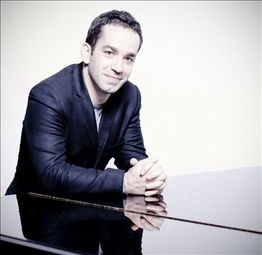 Israeli pianist Inon Barnatan.
Israeli pianist Inon Barnatan. The well-known and much-admired Denk was originally scheduled to come to Toronto, but illness forced him to cancel. Barnatan was flown in, and his replacement recital served as the vehicle for his Toronto debut as a soloist.
For his TSM recital, he brought some big-name composers in his bags: selections by Brahms and Schubert that aren’t among those composers’ most famous works. This was a recital for connoisseurs. (And, for this, he was in the right place: Toronto Summer Music’s patrons are hard-core classical music fans.)
Barnatan opened with Brahms’ left-handed piano transcription of J.S. Bach’s Chaconne in D Minor. It isn’t easy to play such a piece on the piano – and I wonder how many pianists would dare to do it on stage. There wasn’t anything pointedly “Baroque” about his performance; rather he took a Romantic approach, transforming the piece into a vast, grande ligne landscape, through which the pianist traveled on a heroic, epic journey. His playing was supple, but not homogenized – on the contrary, there were jagged, irregular passages that added to the music’s richness. And when the work’s largely monophonic texture gave way to chordal passages, the effect was glorious.
For Brahms’ Variations and Fugue on a Theme by Handel, Barnatan took a different approach. Here, he turned on the charm: his interpretation was dominated by sweetness and innocence, and his touch was generally quite smooth. (It was here that I noticed that Barnatan often plays with a bemused smile on his face, as though he were sharing a pleasant story with his listeners.) Insightfully, he found a fresh characterization for each variation: tender, flashy, playful and lush, among others. With the final fugue, he returned to the taut intensity of the Bach transcription, and built up to a powerful, fingers-of-steel finale.
In Schubert’s half-hour-long Sonata No. 21 in B Flat Major, Barnatan demonstrated that his own musical ideas were as expansive as the composer’s. In the first movement, he played with great purity of tone, creating an atmosphere of mystical serenity, disturbed by dark rumblings and a few sudden shifts in dynamics. The second movement was even more introspective, and here he introduced a touch of “Winterreise bleakness.” Pleasantly, this was followed by a sparkling, elfin scherzo. And the last movement was bursting with dramatic contrasts.
By the end of evening, Barnatan was entirely forgiven for not being Jeremy Denk. (Jeremy who?) I hope he returns to Toronto sometime soon. Apparently, Barnatan likes to play contemporary music: George Crumb, Kaija Saariaho and Judith Weir are said to be among his favourites. It would be interesting to hear what he can do with a program by those composers.
© Colin Eatock 2016
 RSS Feed
RSS Feed

